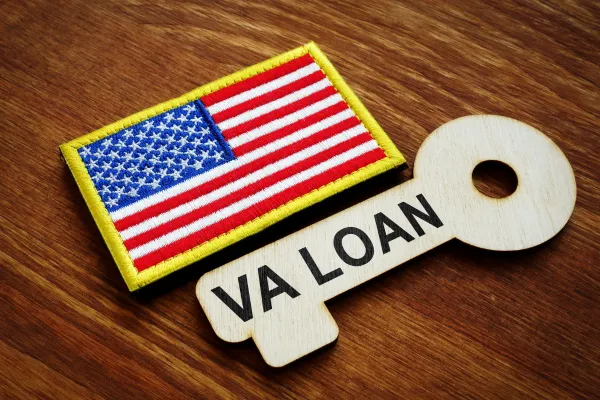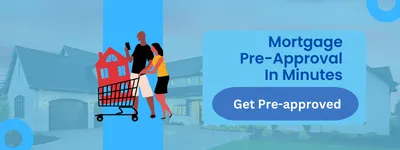
Fact Checked
VA Loans: What First-Time Home Buyers Should Know
Our guidance draws upon our extensive expertise within the mortgage industry, and our unwavering commitment lies in assisting you in realizing your dream of homeownership.
Minimum Credit Score: 580
Down Payment Required: 0%
Mortgage Insurance: None
Loan Limits: None
The VA Loan, officially known as the VA Guaranteed Home Loan, is a valuable no down payment mortgage option available to active members of the military, discharged veterans, and surviving spouses. It is often referred to by various shorthand names, including the VA loan, VA Mortgage, or military mortgage.
Eligible homebuyers can take advantage of this program to secure attractive interest rates, all backed by the U.S. government.
What is a VA Loan?
VA loans have their origins in the 1944 G.I. Bill, a historic piece of legislation that played a pivotal role in assisting returning WWII service members in achieving their dream of homeownership, fostering stability, and fortifying communities across the United States.
Today, over 400,000 veterans turn to VA loans annually as a means to realize their homeownership aspirations.
Key advantages of VA-backed mortgages encompass:
- Zero Down Payment Requirement
- Freedom from Mortgage Insurance
- Beneficial Below-Market Interest Rates
Furthermore, it's worth noting that VA loans are not subject to any predefined mortgage loan limits, making them a flexible and accessible option for veterans seeking homeownership.

Benefits of VA Loans
VA Loans: A Comprehensive Guide for Eligible Homebuyers
The Department of Veterans Affairs extends a range of benefits and services to U.S. veterans, among which is the invaluable mortgage loan guaranty benefit for service members seeking to purchase or build homes.
VA loans present a versatile option, allowing homebuyers to acquire single-family homes, condominiums, and multi-unit properties, with choices available between fixed-rate and adjustable-rate mortgages.
Key Highlights of VA Loans:
1. No Down Payment Required
- VA loans offer the flexibility of 100% financing.
- While an optional down payment is permissible, it is not mandatory. Typically, the average VA loan down payment hovers around 2%.
2. Freedom from Private Mortgage Insurance (PMI)
- Unlike other government mortgage programs such as FHA and conventional mortgages, VA Home Loans eliminate the need for ongoing mortgage insurance payments, further enhancing affordability for military veterans.
3. Competitive Interest Rates
- Mortgage lenders extend VA mortgage rates that often fall below national averages. This is attributed to the security provided by VA home loan benefits, which guarantee a portion of every loan against potential loss. VA mortgage rates can be up to 0.25 percentage points lower than comparable conforming 30-year fixed rates.
4. No Minimum Credit Score Requirement
- VA mortgage guidelines do not enforce a minimum credit score, making VA loans accessible to buyers with varying credit profiles. Nevertheless, some lenders may stipulate a minimum credit score of 580.
5. Limited Closing Costs
- The VA Home Loan program imposes restrictions on buyer closing costs, primarily encompassing mortgage discount points and certain third-party expenses like government fees.
- Lenders are prohibited from charging VA homebuyers for items like attorney fees, real estate commissions, and third-party appraisals. Service fees from lenders cannot encompass overhead items like postage, notary services, and loan settlement fees.
6. Repeated Usage of VA Home Loan Benefits
- The VA Home Loan program offers a lifetime benefit with no expiration or usage restrictions. Eligible service members can leverage VA loan benefits to purchase both their initial and subsequent homes throughout their lifetime.
7. Assumable VA-backed Mortgages
- VA-backed mortgages are assumable, allowing them to be transferred to a future homebuyer while retaining the existing mortgage rate. Even non-veteran buyers can assume VA home loans, provided they meet standard VA credit and income qualifications. A 0.5 percent fee may be applicable on the remaining loan balance.
8. No VA Mortgage Loan Limits
- VA loan limits pertain to the Department of Veterans Affairs' guaranteed amount on a mortgage loan. However, there are no VA loan limits for first-time homebuyers and veterans with full VA entitlement. Buyers with less than full entitlement are subject to standard VA loan limits, mirroring conforming mortgage loan limits.
VA Home Loan Eligibility Requirements
VA home loan eligibility hinges on two primary criteria:
1. Service-Based Eligibility
Eligibility is founded on military service and encompasses active duty and retired personnel across all branches of the U.S. military, including the National Guard and Reserves.
A valid Certificate of Eligibility (COE) is essential to secure approval and must be accompanied by compliance with the minimum service time standards stipulated by the Department of Veterans Affairs.
2. Mortgage-Based Eligibility
Mortgage-based eligibility is contingent on various factors, including occupancy rules, residual income levels, debt-to-income ratios, and minimum credit scores.
Certificate of Eligibility (COE) Requirement
A COE serves as proof of military service and VA home loan benefits eligibility, obtainable through the eBenefits website or by mail. It may also indicate whether buyers qualify for a mortgage funding fee discount.
VA Minimum Service Requirements
To qualify for the VA Home Loan program, homebuyers must meet one or more of the following VA service requirements:
90 consecutive days of active service during wartime
181 days of active service during peacetime
Six years of service in the National Guard or Reserves
90 days under Title 32 orders with at least thirty consecutive days
Additionally, spouses of service members who died while serving or due to service-related disabilities may also be eligible for VA loans.
Service Requirement Exceptions
The VA offers exceptions for service members discharged from the military under specific circumstances, such as medical conditions or service-related disabilities, hardship, and reductions in force. Exceptions may also apply to those discharged for early out after serving at least twenty-one months of a two-year enlistment.
Primary Residence Requirement
VA home loans mandate that homebuyers move into their homes within 60 days following closing and establish them as their primary residences. Exceptions are available for active duty service members and civilian borrowers working overseas. Rental property use is prohibited.
VA Residual Income Requirements
Residual income signifies the funds remaining after covering major monthly expenses like loan payments, credit card bills, child care, and utilities. VA mandates compliance with residual income thresholds based on location, family size, and loan amount.
In summary, VA loans provide military veterans with an array of compelling benefits, offering a pathway to homeownership with advantageous terms and flexible eligibility criteria.
Meeting Lender's Requirements for VA Loans
When pursuing VA loans, homebuyers need to fulfill certain lender requirements, which include factors like debt-to-income ratios, credit scores, and property standards. Here's what you need to know:
1. Debt-to-Income (DTI) Requirements
- The VA employs residual income as its primary measure of home affordability, which doesn't entail a specific debt-to-income (DTI) limitation within its guidelines.
- While there's no strict DTI limit, the Department of Veterans Affairs advises mortgage lenders to exercise additional scrutiny for borrowers whose DTI surpasses 41 percent.
- Consequently, some lenders may restrict DTI on VA-backed mortgages to 41 percent, while others might permit debt-to-income ratios exceeding 50 percent or even higher, contingent on the applicant's creditworthiness and financial profile.
2. Credit Score Requirements
- VA-backed mortgage loans do not mandate a minimum credit score, providing flexibility to borrowers. Nonetheless, the VA encourages mortgage lenders to make prudent lending decisions.
- As a result, many mortgage companies require a minimum FICO score of 580. If you need guidance on improving your credit score, consider exploring resources on credit score enhancement.
- According to mortgage software company ICE, the typical FICO score for a VA homebuyer stands at 723.
3. Meeting VA Minimum Property Requirements (MPRs)
- The VA stipulates specific property requirements for homes financed through VA loans, encompassing safety, structural integrity, and sanitation. These criteria are typically verified through a professional home inspection.
- Safe: Mechanical and electrical systems should be in proper working condition, with non-lead-based paint and compliance with local safety codes.
- Structurally Sound: The property must possess a solid foundation, intact floors and walls, a well-maintained roof, and effective drainage.
- Sanitary: VA-backed homes should be free from pests, mold, and rot, and must have a safe water supply.
- Additionally, VA-backed homes must be free from workmanship defects and decay.
By satisfying these requirements, homebuyers can navigate the process of obtaining a VA loan with confidence and enhance their chances of approval.
Types of VA Loans
The VA Home Loan program offers a wide range of mortgage loan options, including purchase, refinance, and cash-out refinance. Eligible service members can even use VA loans to fund construction-related projects, making it a versatile choice for residential property financing.
VA Loans Across the Nation:
VA loans are not restricted by location; they can be utilized anywhere in the United States, as well as its territories and possessions. This includes Puerto Rico, Guam, the Virgin Islands, American Samoa, and the Northern Mariana Islands.
1. VA Purchase Loan:
VA purchase loans are designed for buying owner-occupied homes, whether they are single-family residences or properties with up to four units. These homes must meet VA minimum property requirements. The best part? No down payment is required, and ongoing mortgage insurance payments are also not necessary.
2. VA IRRRL (Interest Rate Reduction Loan):
The VA Interest Rate Reduction Loan (IRRRL) is a hassle-free refinance program tailored for VA-backed homeowners. The IRRRL approval process focuses solely on payment history and savings, bypassing the need for appraisals, credit score checks, or income verification.
3. VA Cash Out Refinance:
Veterans can leverage the VA Cash Out Refinance program to replace their existing VA-backed loan with a larger one. The difference in loan size is provided in cash, offering flexibility for various purposes such as home improvements, debt consolidation, or education expenses.
It's worth noting that while VA mortgage guidelines don't impose a maximum loan-to-value (LTV) limit for Cash Out Refinances, many lenders opt for a 90% LTV cash-out limitation.
By understanding the versatility of VA Home Loans, eligible individuals can make informed decisions that suit their financial needs and homeownership goals.
How To Buy a Home With a VA Loan
Purchasing a home using a VA loan stands apart from conventional mortgage financing or FHA-insured mortgages. The VA Home Loan program distinguishes itself with its structured approach, prioritizing safety, soundness, and sanitation standards for every supported home. Its guidelines are designed to empower homebuyers, ensuring VA home affordability.
The Department of Veterans Affairs offers valuable resources on its public-facing website, guiding potential buyers on how to secure a home with a VA-backed loan. The process can be broken down into ten essential steps:
Obtain your Certificate of Eligibility (COE) from the VA website.
Determine your monthly housing budget and decide on the possibility of an optional down payment.
Obtain a mortgage pre-approval, including a thorough review of your credit and income.
Choose a real estate agent, either through a personal referral or an online web service.
Discover your dream home and submit a sales contract, ensuring it includes the appropriate VA clauses.
Negotiate the terms of your sales contract, including the closing date.
Lock in a mortgage rate with your VA mortgage lender.
Conduct a comprehensive inspection of the home to assess its soundness and identify any defects.
Receive and review your VA disclosures and the mortgage approval contract.
Sign for your new home and plan your move-in within 60 days.
Additionally, it's important to note that the VA Home Loan program imposes a one-time, upfront closing cost on most loans known as a Funding Fee. Funding fees can range up to 3.6 percent of the VA loan size, with first-time homebuyers typically paying a 2.3 percent funding fee.
However, certain VA borrowers are exempt from funding fees, including Purple Heart recipients, veterans with service-related disabilities, and surviving spouses of service members who receive Dependency and Indemnity Compensation. Furthermore, funding fees decrease as down payments increase, offering additional savings for eligible homebuyers.

Frequently Asked Questions About VA Loans
How Do I Apply for VA Loans?
You don't apply for VA loans directly with the Department of Veterans Affairs. Instead, homebuyers can apply for a VA-backed mortgage through a VA-approved lender. To get started, you can initiate the process on LoveYourRate.com.
What Is the VA Loan Limit for First-Time Homebuyer?
The VA Home Loan program is an excellent choice for first-time homebuyers because you can borrow as much money as your lender allows to purchase a home. There are no strict limits imposed by the VA itself.
Can I Use Income from Marijuana for a VA Home Loan?
No, you cannot use income derived from marijuana to qualify for a VA loan. The Department of Veterans Affairs adheres to federal law, and marijuana remains illegal at the federal level. However, income from industries that are not prohibited at the federal level, such as the legal hemp industry, is typically allowed for qualification purposes.
These FAQs provide essential information for prospective VA loan applicants, helping them understand the application process, loan limits, and income qualifications while adhering to federal regulations.



Branch: Canopy Mortgage - TLC Group - 13809 Research Blvd, Ste 500, Austin, TX 78750 | Office #512-598-9093 | NMLSConsumerAccess.org #: 1359687 | Equal Housing Lender -All loans subject to credit and property approval.
Consumers wishing to file a complaint against a banker or a residential mortgage loan originator should complete and send a complaint form to the Texas department of savings and mortgage lending, 2601 North Lamar, suite 201, Austin, Texas 78705. Complaint forms and instructions may be obtained from the department’s website at www.sml.texas.gov. A toll-free consumer hotline is available at 1-877-276-5550. The department maintains a recovery fund to make payments of certain actual out of pocket damages sustained by borrowers caused by acts of licensed residential mortgage loan originators. A written application for reimbursement from the recovery fund must be filed with and investigated by the department prior to the payment of a claim. For more information about the recovery fund, please consult the department’s website at www.sml.texas.gov. State Licenses page, Privacy Policy, and Terms of Use

Facebook
Instagram
LinkedIn
Youtube
TikTok